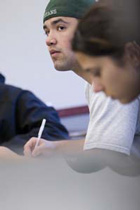Political Science Curriculum Overview
Our curriculum provides a necessary core of knowledge, including American government, international and comparative politics, political theory, and the role of scholarly research in understanding modern government and politics.
Students begin with basic courses that examine the general concepts, institutions, and empirical patterns of the discipline's major sub-fields.
Then, working closely with faculty advisors, students develop an individualized Political Science program that concentrates on a specific area (or areas) of interest or particular career goals.

In addition, students take courses from many other liberal arts disciplines: sociology, history, economics, foreign languages, religion, or the fine arts. Please see this guide to complementary classes for different sub-disciplinary tracks in political science: Political Science Complementary Course Recommendations.
Students learn that political institutions and processes do not develop in a vacuum; instead, they reflect the cultures, values, beliefs, historical experiences, and economic conditions of the societies in which they exist.
As the culminating academic experience for political science majors, the Political Research Seminar provides an opportunity for conducting original political science research and the integration of knowledge at an advanced level. To see examples of Political Research Seminar type work, see our Res Publica journal of political science or visit the Student Honors Research Papers collection.
For more information, see Course Descriptions and Major & Minor Requirements.

William Munro - Betty Ritchie-Birrer '47 and Ivan Birrer, Ph.D. Endowed Professor of Political Science
Department - Political Science